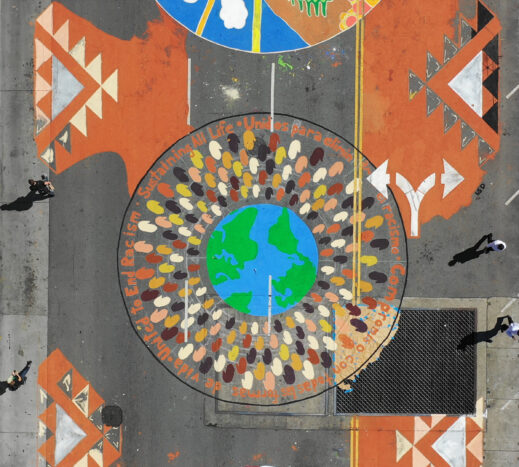
View this resource
as a PDF
(with Citations and sources) >>>
****
View this resource
in French>>>
****
View this resource
in Spanish>>>
In order to solve the climate crisis, humanity must very rapidly stop emissions of carbon dioxide, methane, and other greenhouse gasses everywhere in the world. This will mean ending our global use of fossil fuels, widely adopting renewable energy and regenerative agricultural practices, reversing deforestation, and eating primarily plant-based diets.
Emissions must be eliminated everywhere
Emissions from the wealthiest nations have been the primary cause of the climate crisis. The world’s wealthiest nations currently account for 40% of all emissions, but comprise only 16% of the world’s population. Ending emissions in the wealthy nations is key to addressing the climate emergency.
Achieving zero emissions in the currently high-emitting wealthy countries will not be sufficient, however. Although many countries of the Global South have contributed little to creating the climate crisis, it is estimated that by 2030 more than half of all global emissions will come from economically emerging nations (even without accounting for emissions from China). Eliminating emissions from the Global South will be key to solving the climate crisis and will improve public health and prosperity in those nations. We must eliminate emissions everywhere because emissions anywhere cause climate change everywhere.
Historical and current exploitation and extraction limit the resources of most nations in the Global South for mitigation, adaptation, and loss and damage.
All countries must have the means to develop an energy infrastructure and provide a good life for their people. Many nations in the Global South lack resources because wealthier countries have been extracting their resources for years without fair compensation. Countries in the Global North continue to take wealth from nations they had once colonized. Estimates of the value of the resources taken are currently on the order of USD 2.2 trillion per year.
In addition to losing valuable resources to nations of the Global North, Global South countries have incurred large amounts of debt, some of which was needed to pay for climate damage that these nations had little or no responsibility for causing. Many loans from wealthy nations have required Global South countries to spend the borrowed funds purchasing goods and services from the donor nation for projects approved by the donor nation—resulting, for example, in coal-fired power plants or roads to service oil infrastructure that profited the donor nation and left the recipient nation more in debt. Payment of theses debts, including debt owed to the World Bank and International Monetary Fund (IMF), continues to drain resources from the Global South, leaving them no resource to eliminate current emissions (for example by transitioning to renewable energy), adapt to the effects of climate change, or pay for the immense loss and damage caused by climate change.
Sources of economic support for Global South and frontline nations
Funding solutions to the global climate crisis must be our highest priority. The sums needed are far beyond the reach of the nations of the Global South. It is estimated that by 2030 these nations will need $1 trillion per year of climate financing from external sources. If we don’t allocate large sums of money to address the climate crisis, we risk the survival of our species.
In 2009, the nations of the Global North committed to mobilizing $100 billion per year of climate financing for the Global South by 2020. Even this inadequate amount has not yet been provided. Where can we get the money? How do we raise these funds without further burdening working class and poor people?
Taxation and “Fair Share” strategies
A key strategy for generating economic resource is to tax the wealthiest fossil fuel companies. At COP27, the Secretary-General of the UN and some of the small island nations proposed that all nations tax the profits of the oil companies to pay for loss and damage caused by climate change. They noted that the six largest fossil fuel companies made roughly $75 billion in profits in the first half of 2022, enough to pay for the cost of major climate damages in the Global South. A 2023 study proposed that the top 21 fossil fuel companies pay reparations for the climate damage expected to be caused by their products between 2025 and 2050, which is calculated to be approximately $5.4 trillion.
We can also tax wealthy individuals and high annual earners. Wealth inequality globally is great, and increasing. The world’s richest 500 people added an average of $14 million per day to their wealth over the 1st 6 months of 2023. The world’s richest 1% have gained 74 times more wealth than the bottom 50% in the last 10 years. The wealthiest 10 multi-billionaires now have six times the wealth of the most impoverished 3.1 billion people.
Fair share
“Fair share” campaigns propose that the countries of the Global North pay their “fair share” of the cost of addressing the climate crisis. Most campaigns recommend that fair shares be calculated based on the following: 1) the historical responsibility of each nation for causing the climate crisis through their cumulative emissions, and 2) the capacity of each nation to pay, based on their national wealth over and above what is needed to provide an acceptable standard of living for their people.
At Sustaining All Life (SAL), we recommend that “fair shares” be based entirely on capacity to pay. All excess resources must be accessed to solve the climate emergency. By sharing the wealth of the world, we can solve this crisis and move a long way forward toward creating a better world.
In addition to taxation and fair share strategies, we can:
- Eliminate current subsidies for fossil fuels (Current government subsidies are over half a trillion dollars per year for activities that cause $6 trillion per year in harmful effects.)
- Cancel the debt of nations in the Global South
- Redesign the World Bank, International Monetary Fund, and other multilateral banks to provide low- or no-interest loans to Global South nations for climate action, free of conditions
- Dramatically reduce the military budgets of the U.S. and other nations with large military expenditures and redirect that money to climate mitigation and adaptation projects
Success is possible and necessary
Despite the obvious challenges to persuading people and governments in the wealthy nations to adopt these resource-generation strategies, we believe that this can be accomplished because:
- Providing these funds is the only course of action that can stop and reverse global warming
- The large amounts of money needed can come from those who have significant wealth
- Ending the climate crisis is in the self-interest of the wealthy nations as well as the poorer ones
- Ending the climate crisis would be a major step in the direction of global equity and justice
- Human beings have an immense capacity to care for each other and can be inspired to see themselves as a part of one global community coming together to sustain all life.
Personal work
People of the Global North have personal, internal work to do to act boldly and equitably to solve the climate emergency. We can:
- Face how serious the climate emergency is
- Accept the responsibility that our nations have for creating both the climate crisis and global wealth inequality
- Deepen our understanding of the history of colonialism and neo-colonialism in making the Global North wealthy while impoverishing the Global South
- Deepen our understanding of the ongoing role of greed in the Global North
- Face the effects of racism personally, nationally, and globally
- Notice our feelings of hopelessness, powerlessness, despair, insignificance, and of being on our own, without being stopped by those feelings
- Notice where we (and others) have been conditioned to want more than we need for ourselves, our people, and our nation. We can instead fully commit to the principles that everyone, everywhere matters and that we can build an equitable global society that works for everyone.
As we do this personal work, it will be useful for us to be listened to by a caring listener who welcomes open expression of our feelings. It is useful to release our painful feelings through talking, crying, laughing, trembling with fear, and expressions of anger. As we unload these emotional burdens, we increase our ability to act boldly and effectively. Sustaining All Life (SAL) “listening exchanges” are an effective tool for individuals and groups to do this work.
Actions to take now
We can all communicate clearly that we must work to raise the funds that can enable all of humanity to eliminate emissions, adapt to climate change, and pay for loss and damage. We can also:
- Spread this understanding and build support for fair share financing – in our own organizations and among our own contacts – throughout the climate movement – in the public at large
- Work for the elimination of racism in the climate movement and in the general population. (Racism often results in white people in wealthy nations being unable to seriously address the needs or follow the lead of people and nations of the global majority[*] and Indigenous/Native people.)
- Advocate for canceling the debt of nations in the Global South and redesigning multinational financial institutions.
- Advocate for immediately eliminating fossil fuel subsidies and redirecting funds from military budgets in the Global North to climate action in the
Global South. - Advocate for the nations of the Global North to commit to major fair share global climate financing, raising the money as described in this article.
- Assist others to do the “personal work” listed above.
No need to wait
One of the key insights of Sustaining All Life is that it is possible for each of us to act in spite of our feelings of discouragement. We do not need to wait until we feel confident, unafraid, or sure of success. We can act now, with all our uncertainties, to connect with other people and build a powerful movement for global equity in climate financing.
[1] The peoples of Africa, Asia, the Pacific Islands, the Caribbean, and Latin America, and those descended from them, are over eighty percent of the global population. These people also occupy most of the global land mass.
Using the term “Global Majority (GM)” for these people acknowledges their majority status in the world and interrupts how the dominant (U.S. and European) culture assigns them a minority status.
Many Global Majority people living in dominant-culture countries have been assimilated into the dominant culture—by force, in order to survive, in seeking a better life for themselves and their families, or in pursuing the economic, political, or other inclusion of their communities. Calling these people “Global Majority” contradicts the assimilation.


